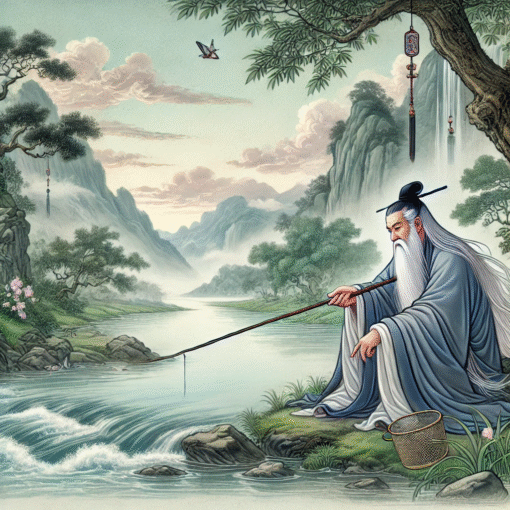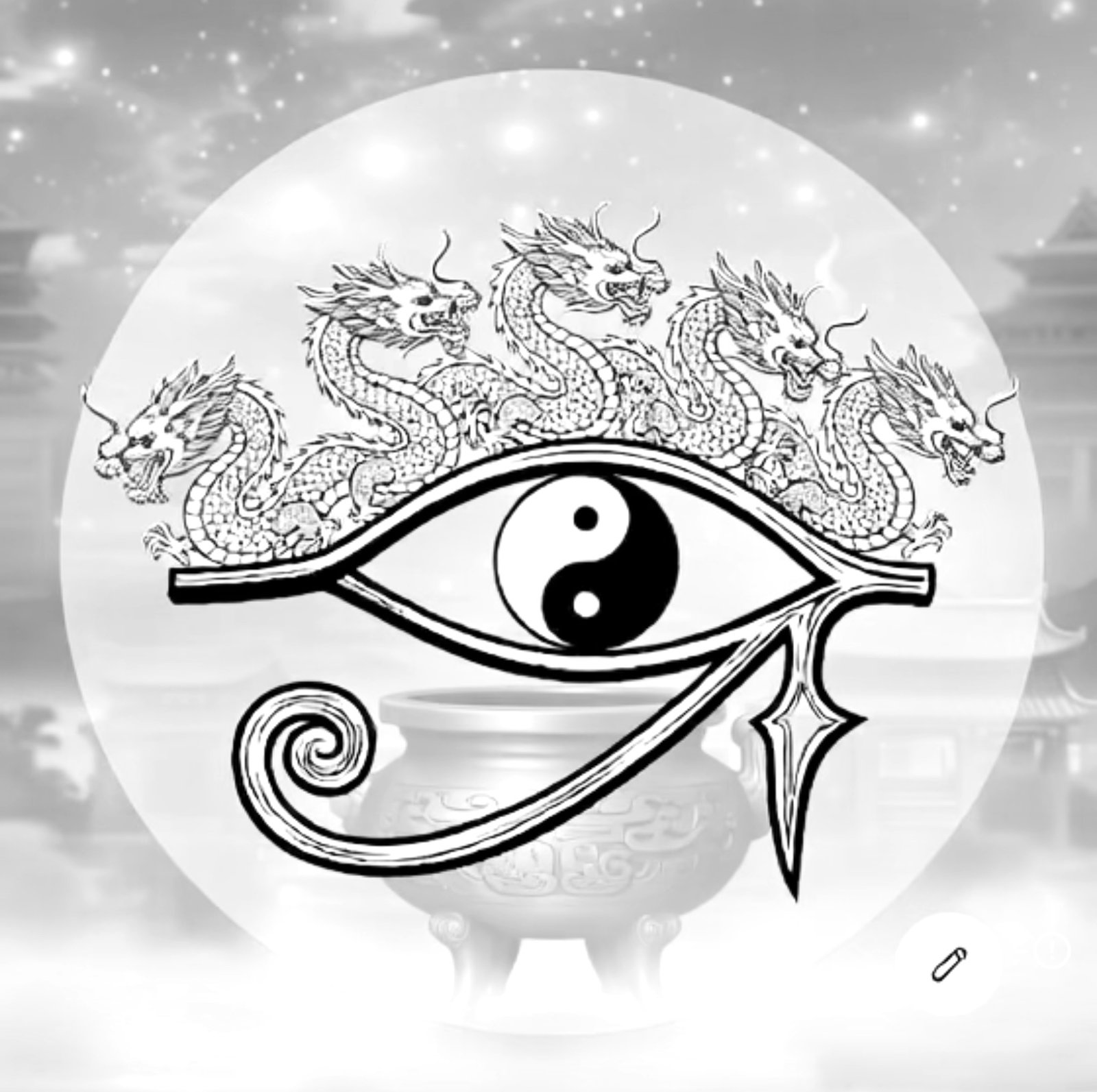
Jiang Taigong (姜子牙), also known as Jiang Ziya or by his honorific title Jiang Taigong Wang (姜太公望), is a colossal figure in Chinese history, mythology, and esoteric philosophy. He is not merely a historical personage but a cultural archetype of the wise sage who masters destiny itself.
To understand him is to understand a cornerstone of East Asian strategic and mystical thought.
1. The Historical Core: The Strategist Who Built an Empire
At his historical core, Jiang Taigong is revered as the brilliant military strategist and prime minister who helped King Wen and King Wu of the Zhou Dynasty overthrow the corrupt Shang Dynasty (c. 1046 BCE).
- The Meeting of Legends: The most famous story describes him as a wise old man fishing by the Weishui River—using a straight hook, without bait, three feet above the water. His famous line was, “If the fish is willing, it will bite the hook itself.” This eccentric display was a ploy to attract the attention of the virtuous King Wen, who was searching for a sage to aid him. King Wen, recognizing his unparalleled wisdom, invited Jiang Taigong to be his chief advisor.
- The Architect of Victory: He is credited with masterminding the Zhou military strategy and political propaganda that led to their decisive victory at the Battle of Muye. For this, he was enfeoffed as the ruler of the state of Qi, which became a powerful and prosperous region.
2. The Mythological Figure: The Grandmaster of Gods
Over centuries, Jiang Taigong’s legend grew into the realm of myth and divinity.
- Investiture of the Gods (封神演义 – Fengshen Yanyi): This Ming-era epic novel deifies him completely. In this mythological narrative, the conflict between the Shang and Zhou dynasties is a proxy war between the gods. Jiang Taigong acts as the proxy of the heavens, managing the conflict and, after victory, presiding over the “Fengshen” ceremony—the “Investiture of the Gods.”
- The God Who Appoints Gods: In this role, he is the master of the divine roster. He bestowed titles and domains upon the fallen heroes and generals of both sides, appointing them to their positions in the celestial bureaucracy. This is why he is often called Jiang Taigong Wang, meaning “Jiang the Grand Duke” or “Jiang, the One who the Grand Duke Awaited.”
- A Unique Divine Status: A common folk belief states that “Wherever Jiang Taigong is, no god may take the primary seat.” Because he was the one who appointed all the gods, his authority is above them all. It is traditional to put an inscription reading “Jiang Taigong is here; all evils avoid!” (姜太公在此,百無禁忌) on buildings during construction or on homes to ward off evil spirits and misfortune. His presence commands respect from the entire spiritual world.
3. The Esoteric Legacy: Patron of Divination and Strategy
This is the most important aspect in the context of BaZi and I Ching.
- Patron Sage of Divination: Jiang Taigong is traditionally hailed as a pioneer and master of all esoteric arts, including astrology, strategy, and divination. He is deeply associated with the I Ching (Book of Changes). While the I Ching’s origins are attributed to earlier figures like King Wen, Jiang Taigong is a key figure in its application and transmission as a tool of statecraft and warfare.
- Connection to BaZi (Four Pillars of Destiny): Although the formal system of BaZi as we know it was codified later (by Li Xuzhong in the Tang Dynasty), its philosophical roots are in the same ancient Daoist cosmology that Jiang Taigong mastered. He is seen as a fountainhead of this wisdom, a symbolic progenitor of the art of decoding destiny through time and the elements. Practitioners often pay homage to him as the originating sage of their tradition.
In Summary: Who is Jiang Taigong?
He is a unique trinity:
- The Historical Architect: The brilliant strategist who founded the Zhou Dynasty.
- The Mythological Divinity: The master of the celestial bureaucracy who appointed all the gods.
- The Esoteric Patron: The archetypal sage of divination, strategy, and the mystical arts, whose wisdom forms the legendary foundation for systems like the I Ching and, by extension, BaZi.
When your reading is framed within the wisdom of Jiang Taigong, it is not just an analysis; it is an initiation into a thousands-year-old tradition of mastering one’s destiny—a tradition begun by the man who was wise enough to fish with a straight hook and powerful enough to command the gods themselves.
Fishing Without Bait: Jiang Tai Gong’s Timeless Secret
Let’s discover the legendary story of Jiang Tai Gong (Jiang Ziya), the Chinese strategist who famously “fishing without bait,” illustrating patience, wisdom, and strategic thinking.
In the mists of ancient China, there lived a man who seemed, to most, a little odd.
Jiang Tai Gong could often be found seated quietly by the riverbank, rod in hand, his line drifting into the water. Yet there was something unusual: his hook carried no bait.
Onlookers mocked him.
“How can you catch fish without bait?” they asked, shaking their heads at his apparent folly.
Jiang Tai Gong only smiled.
“I am not fishing for ordinary fish,” he replied softly. “I am waiting for the one that comes of its own will.”
He wasn’t after fish at all. He was waiting for destiny. His “catch” would not be a carp or trout, but a ruler wise enough to recognize his gifts and bold enough to invite him into the heart of history.
And so it happened. Word of this strange fisherman reached King Wen of Zhou. The king, sensing profound meaning in such an act of patience and symbolism, sought him out. From that day forward, Jiang Tai Gong became his most trusted adviser, guiding the rise of the Zhou Dynasty.
The Symbolism of Fishing Without Bait
On the surface, Jiang Tai Gong’s method seems absurd. Yet behind it lies a wisdom that transcends centuries:
- Patience and Timing
The river teaches that no fish can be forced to bite. In life, true opportunities arrive in their own season. - Calling the Right Opportunities
Bait attracts anything that bites—often the wrong catch. Without bait, only what truly belongs to you will come. - Strategic Presence
He sat by the river where all could see, quietly embodying his truth until destiny itself noticed.
Why This Ancient Tale Matters Today
Though born of legend, Jiang Tai Gong’s wisdom carries practical relevance for our age of urgency:
- In Careers and Business
Instead of chasing every lead, position yourself with clarity. Authentic visibility draws the right partners, investors, or clients. - In Relationships and Networking
The deepest bonds form when you are fully yourself. No need for masks or lures. - In Personal Growth
Trust that your skills and spirit will be recognized. Growth is not rushed; it unfolds.
Mystical Roots, Practical Lessons
Chinese culture remembers Jiang Tai Gong as more than a strategist—he is a symbol of wu wei (无为), the Taoist principle of effortless action. His stillness was not inaction, but alignment. He trusted the current of life, knowing that what is meant will arrive without force.
The lesson is clear: true worth does not beg for recognition. It radiates quietly until the right eyes see it.
How to Fish Without Bait in Our Time
- Be patient: Rushing only invites the wrong outcomes.
- Hold your ground: Stand where your talents shine, where destiny can find you.
- Choose quality over quantity: One meaningful opportunity outweighs a dozen hollow ones.
We see this wisdom alive today:
- Entrepreneurs who let excellence speak louder than advertising.
- Creators whose authenticity attracts loyal audiences.
- Individuals whose integrity draws true companions.
Conclusion: The River Still Whispers
The story of Jiang Tai Gong is not simply an ancient fable—it is a mirror for our own restless times.
Sometimes the most powerful act is to do less, not more. To sit by the river of life with clarity, calmness, and trust. To let go of frantic baiting and instead embody a presence so true that the right opportunity has no choice but to find you.
Remember the fisherman with no bait. His wisdom flows through centuries to remind us:
What is truly yours will never pass you by.
Dao Arts Centre offers DESTINY BLUEPRINT reading, combining ancient BaZi and I Ching Birth Hexagram Reading. Discover more HERE
